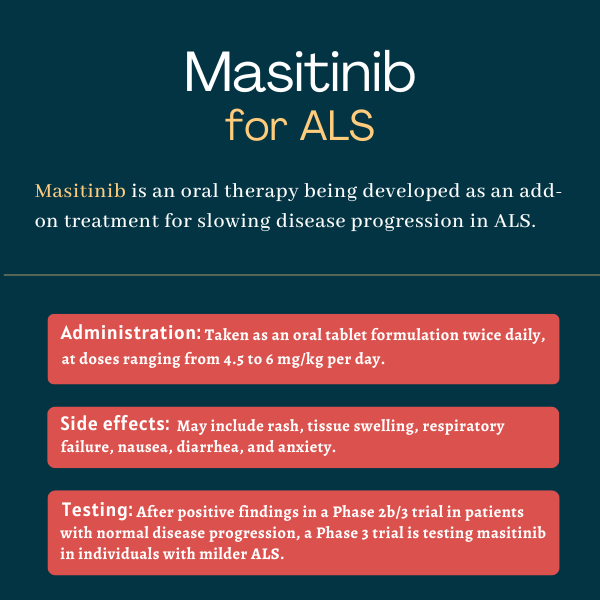 Discussion
Discussion
FAQs about masitinib
Masitinib is an experimental oral therapy being investigated in clinical trials as a potential treatment for amyotrophic lateral sclerosis (ALS). It works by blocking specific proteins called tyrosine kinases, which is expected to reduce the inflammation thought to be involved in ALS progression. In ALS clinical trials, the therapy helped to slow functional decline and significantly extended survival in a subgroup of patients.
At present, it is too early to determine if or when masitinib might be up for approval by the U.S. Food and Drug Administration. The therapy has been submitted for conditional approval in Europe and in Canada, but Health Canada rejected the application and a European committee recommended against approval twice.
The most common side effects reported in amyotrophic lateral sclerosis clinical trials of masitinib included rash, tissue swelling, respiratory failure, nausea, diarrhea, and anxiety. Yet, because the drug is still in clinical testing, its full safety profile may not be fully known. Patients taking masitinib should discuss the potential side effects of the medication with their healthcare provider.
The interaction between masitinib and alcohol has not been studied in-depth. It’s recommended patients talk to their healthcare team about whether and how much is safe for them to drink while taking any medication.
In a Phase 2/3 trial, a significant difference in amyotrophic lateral sclerosis progression rates was evident between masitinib and a placebo in a subgroup of patients after about a year of treatment. However, each person may respond differently to the medication, so patients should ask their healthcare team how the treatment may affect them.
Related Articles
 Fact-checked by
Fact-checked by 




